The big budget Cleopatra is renowned as something of a massive contradiction. It was panned mercilessly by critics, and yet picked up four Academy Awards (and five more nominations). It was the most financially successful movie of the year, and yet still turned a fairly substantial loss. It’s one of the last great Hollywood epics, and it almost killed Twentieth Century Fox. So there’s something strangely fitting about the final line, in which it was suggested that the movie’s subject was “the last of so many noble rulers.” In many ways, the film was the last of its kind, but perhaps the most lavish. Perhaps history has been kinder to the production than its initial release was, but it’s still a very flawed film.
Cleopatra is four hours long. That’s an exceptionally long time. When you consider that the first cut presented to studio executives was six hours long, it gives you an indication of how incomplete a four-hour film could possibly be. Even at four hours, the movie seems to be missing certain key moments and developments, which are frequently tripped over by a large and expansive (and revolving) cast.
It had been suggested at one stage that the film be cut in half and released as two distinct movies, following Cleopatra’s relationships with Julius Caesar and Marc Anthony. Studio executives, keen to capitalise on the gossip around the Burton-Taylor romance, would not delay the release of the second half (the one which paired the couple up on screen). In fairness, I don’t think splitting the movie in two would have helped – it is structured as one giant film, despite the revolving cast and shifts in mood. The first half is primarily governed by politics and discussion, with impressive action sequences taking up large chunks of the second half. Separate, the two halves would each have seemed awkward. Caesar’s half would have been “too talky”, with Anthony’s film would have been “too loud.” So, putting the pair together, do we get a good film?
Not really, truth be told. The movie is simply too inconsistent to maintain interest over such a long time. I do believe that, somewhere, there is a four-hour film that can hold an audience’s attention, but this movie really tries to cram too many ideas into its runtime. Despite the fact that Elizabeth Taylor gets top billing and her character’s name brands the film, the movie doesn’t seem consistently concerned with the two most important romances in her life. We get tangents on the burning of Alexandria, or the politics of Rome, or the Roman civil war, all set up and played out – but there’s no joy or fascination in any of these hugely influential moments.
Any of these settings could carry their own historical adaptation. Or, perhaps, they could be mentioned in passing or used as a backdrop to the romances between Cleopatra and her two Roman toyboys. Instead, these elements are treated as hugely important in their own right, until they pass and some new tangent replaces them. However, every time the story zooms out to deal with these important socio-political issues, we lose our place with the characters acting out the drama. As a result, the movie suggests that we have scenes where the characters talk at length about things that we’ve already seen unfold.
It doesn’t help that the dialogue (and most of the delivery) is somewhat awkward. And what isn’t awkward is simply repetitive. The opening scene has a bland narrator fill us in on the story of Romans battling Romans. And then we have Caesar remark, poetically, at length, about the tragedy of the situation. “The smoke of burning Roman dead is just as black,” he assures himself. Some of the writing is half-decent, but there are a lot of stilted lines and deliveries. “I am happy for Caesar!” one character declares, violating the sacred rule that you can’t just have your characters announce how they feel. That makes me angry.
It doesn’t help that the cast don’t really light up the screen. The ensemble is impressive, but only Rex Harrison seems to be approaching the film with any sense of joy or enthusiasm. Despite only featuring as Julius Caesar for half the film, he is easily the best thing about the production. He seems aware that he isn’t working with the best material and that the movie is bloated, so he delivers lines like “we will shop our way to the palace!” with great zeal. The best scene of the entire film, in my humble opinion, has Caesar coaching his young son on how to be a king, talking the young child through what seems almost like a class on improvisation. It’s cheesy, but it’s fun – and Harrison seems to be genuinely enjoying his role. It’s no surprise that he picked up the film’s only acting Oscar nomination.
The trick with Harrison is that he can balance the pomp and ceremony with the rather obvious camp. The rest of the film is not quite so lucky. The sequences involving Caesar playing a prototype of charades with his dumb servant are especially awkward, as are moments where Caesar – ruler of the Roman Empire – is unceremoniously dropped on his bed during and epileptic fit like a drunk after a night out. It’s just hard to take things like Marc Anthony’s leopard-print tunic especially seriously. Although, in fairness, there is a nice joke about Cleopatra’s court playing up the mysticism of Egypt for their Roman guests – especially funny because of the way the film similarly plays up the clichés of Egyptian design (with Cleopatra’s court decorated in styles well out of date by the time she rose to power, sometimes millennia apart).
That said, the production design is stunning. I mean, honestly, some of the sequences are amongst the most impressive ever captured on film – at least from the standpoint of spectacle. The film was originally budgeted to $2m (a lot of money at the time). Somehow, that figure ballooned to $44m – with the studio pumping money into the film because it was “too big to fail.” I don’t know how you make an error like that, but you can see the money on screen. In the era before CGI, everything is real and practical. The sets look especially brilliant, as do shots of crowded market places, and even battlefields. It’s something that you simply couldn’t do these days. Seriously, the rendering of Alexandria is especially awe-inspiring.
However, there are moments where it clearly feels like too much. Quite like the epic and spectacular parade which welcomes Cleopatra to Rome, the movie seems to just go on and on, without end. It helps that we’re looking at something exceptionally beautiful, but the movie seems to be incredibly indulgent. It’s fine for us to linger on impressive-looking sets for the sake of it, but not when the movie also has a lot of plot to work through.
It’s interesting to note, however, the clear political undercurrents which saturate the film. Cleopatra seems clearly influenced and shaped by the Second World War, a conflict still very clear in the world’s memories at the time of production. The film suggests that such ideas echo through eternity, timeless, and draws strong connections between the strategies of these ancient leaders and more modern fascists. This shouldn’t be too surprising, as Julius Caesar was “dictator for life” and the fascist movements of mid-twentieth-century Europe drew a lot of their iconography from Rome, but it’s still strong.
It’s interesting to hear the dictator Caesar urged to “take a little, then a little more, until you have it all” – this was, of course, the strategy used to carve up Europe during the thirties. Caesar’s indifference to the destruction of the Great Library of Alexandria (one of the original seven wonders), draws uncomfortable parallels to the standard operating practices of dictatorships to burn books and knowledge (“neither you nor any other barbarian has the right to destroy one human thought!” Cleopatra warns him). It’s a clever idea, in fairness – and one which does give a little deeper sense of meaning to the story.
However, it also somewhat undermines the characters. Despite having four hours, none of the characters are especially well-drawn and none of them really maintain our sympathy. Sure, Rex Harrison’s Caesar is charming, but he’s also a fascist. Cleopatra is just really a passive observer in all this and seems to exist as a narrative bridge between the stories of Caesar and Anthony. Anthony himself seems vaguely sympathetic at first, but Burton can’t seem to find the man buried beneath the myth – and then there’s the scene where he rides his boat out to his girlfriend in the middle of a battle, leaving all his loyal soldiers in the water to drown. What a junkbag.
The film is too long. It’s too all over the place and inconsistent. Some of the dialogue is nice, but it’s too often stuffy and awkwardly functional. The cast is impressive, but Burton and Taylor don’t really seem to work well together in the big mess of a film around them (it reminds me of what Joey said about chemistry between actors in that episode of Friends). Rex Harrison is fun, but he is gone by the halfway point – and, even then, he isn’t working with the best material. It’s not a terrible film – it certainly has its moments – but it is too wild and inconsistent for its length.
Filed under: Non-Review Reviews | Tagged: Academy Award, blockbuster, Cleopatra, Elizabeth Taylor, epic, film, historical epic, Julius Caesar, Marc Anthony, Mark Antony, Movie, Movies, non-review review, review, Rex Harrison, rome, studio system |















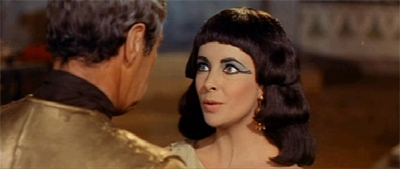
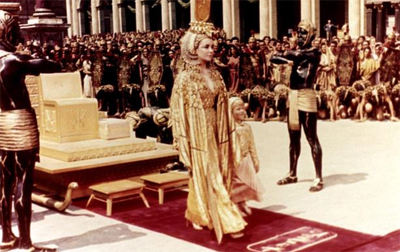

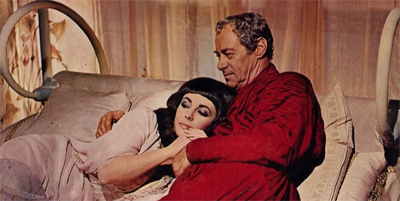
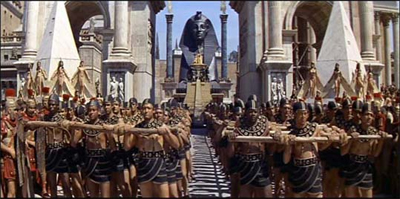
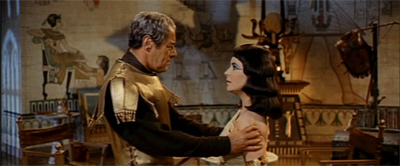
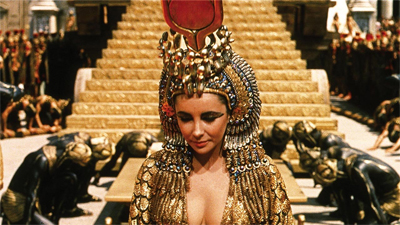





I just saw the movie today for the second time in my life and I couldnt agee with you more. Impressive production but too long!